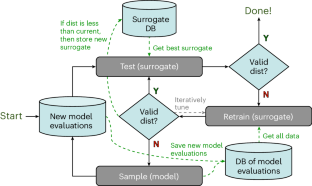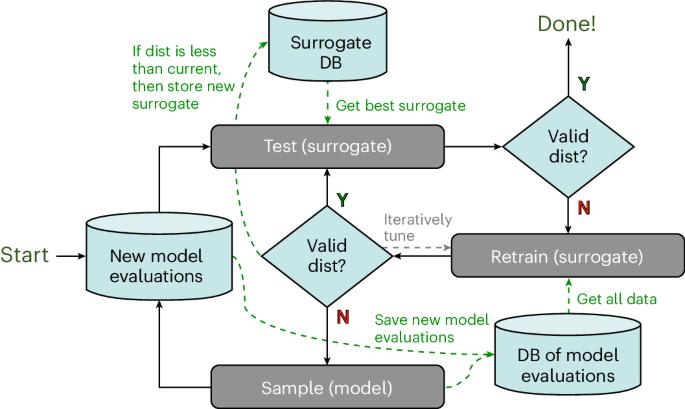Efficient learning of accurate surrogates for simulations of complex systems
IF 23.9
1区 计算机科学
Q1 COMPUTER SCIENCE, ARTIFICIAL INTELLIGENCE
引用次数: 0
Abstract
Machine learning methods are increasingly deployed to construct surrogate models for complex physical systems at a reduced computational cost. However, the predictive capability of these surrogates degrades in the presence of noisy, sparse or dynamic data. We introduce an online learning method empowered by optimizer-driven sampling that has two advantages over current approaches: it ensures that all local extrema (including endpoints) of the model response surface are included in the training data, and it employs a continuous validation and update process in which surrogates undergo retraining when their performance falls below a validity threshold. We find, using benchmark functions, that optimizer-directed sampling generally outperforms traditional sampling methods in terms of accuracy around local extrema even when the scoring metric is biased towards assessing overall accuracy. Finally, the application to dense nuclear matter demonstrates that highly accurate surrogates for a nuclear equation-of-state model can be reliably autogenerated from expensive calculations using few model evaluations. Machine learning-based surrogate models are important to model complex systems at a reduced computational cost; however, they must often be re-evaluated and adapted for validity on future data. Diaw and colleagues propose an online training method leveraging optimizer-directed sampling to produce surrogate models that can be applied to any future data and demonstrate the approach on a dense nuclear-matter equation of state containing a phase transition.


高效学习复杂系统模拟的精确代用指标
人们越来越多地采用机器学习方法来构建复杂物理系统的代用模型,从而降低计算成本。然而,在存在噪声、稀疏或动态数据的情况下,这些代用模型的预测能力会下降。我们引入了一种在线学习方法,该方法由优化器驱动采样,与目前的方法相比有两个优势:它能确保模型响应面的所有局部极值(包括端点)都包含在训练数据中;它还采用了持续验证和更新过程,当代理模型的性能低于有效阈值时,就会对其进行再训练。我们利用基准函数发现,即使评分标准偏向于评估整体准确性,优化器定向采样在局部极值附近的准确性方面也普遍优于传统采样方法。最后,对致密核物质的应用表明,核状态方程模型的高精度替代物可以通过昂贵的计算,使用少量模型评估,可靠地自动生成。
本文章由计算机程序翻译,如有差异,请以英文原文为准。
求助全文
约1分钟内获得全文
求助全文
来源期刊

Nature Machine Intelligence
Multiple-
CiteScore
36.90
自引率
2.10%
发文量
127
期刊介绍:
Nature Machine Intelligence is a distinguished publication that presents original research and reviews on various topics in machine learning, robotics, and AI. Our focus extends beyond these fields, exploring their profound impact on other scientific disciplines, as well as societal and industrial aspects. We recognize limitless possibilities wherein machine intelligence can augment human capabilities and knowledge in domains like scientific exploration, healthcare, medical diagnostics, and the creation of safe and sustainable cities, transportation, and agriculture. Simultaneously, we acknowledge the emergence of ethical, social, and legal concerns due to the rapid pace of advancements.
To foster interdisciplinary discussions on these far-reaching implications, Nature Machine Intelligence serves as a platform for dialogue facilitated through Comments, News Features, News & Views articles, and Correspondence. Our goal is to encourage a comprehensive examination of these subjects.
Similar to all Nature-branded journals, Nature Machine Intelligence operates under the guidance of a team of skilled editors. We adhere to a fair and rigorous peer-review process, ensuring high standards of copy-editing and production, swift publication, and editorial independence.
 求助内容:
求助内容: 应助结果提醒方式:
应助结果提醒方式:


